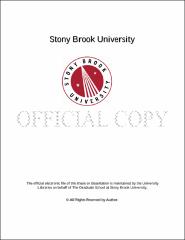| dc.identifier.uri | http://hdl.handle.net/1951/60262 | |
| dc.identifier.uri | http://hdl.handle.net/11401/71528 | |
| dc.description.sponsorship | This work is sponsored by the Stony Brook University Graduate School in compliance with the requirements for completion of degree. | en_US |
| dc.format | Monograph | |
| dc.format.medium | Electronic Resource | en_US |
| dc.language.iso | en_US | |
| dc.publisher | The Graduate School, Stony Brook University: Stony Brook, NY. | |
| dc.type | Dissertation | |
| dcterms.abstract | This work explicates what I identify as the fundamental structure of incompleteness that characterizes the human experience of meaning and that, I argue, informs an ethical imperative in our relations with others. Drawing on the work of Edmund Husserl and Maurice Merleau-Ponty, I begin by showing how we overlook this incompleteness in perception. I argue that our experience of perceptual meaning almost always excludes its essential indeterminacy: that is, we experience meaning as coherent and complete, even though it is necessarily limited by our spatial and temporal situation. I show how what Merleau-Ponty refers to as the "anonymous" body--that which makes possible our participation in the perceptual world--contributes to this pretension and, moreover, informs our preference for what is familiar and complete over what is unfamiliar and incomplete in our experience. I go on to demonstrate how our anonymous facility in the world always includes others, who aid in our development of this anonymous sense of self. I further demonstrate how others also challenge this sense of anonymity, in so far as they expose its limits. However, as in our perceptual life, in our intersubjective life we also resist recognizing these limits. Other people constitute the deepest and most prevalent dimension of indeterminacy in our experience; yet we often perceive them as familiar and easily recognizable and, in doing so, we resolve the ambiguity of our experience of them. I argue that we deny the incompleteness of our access to others because they expose the fundamental tension between the inherent limits of our experience and our comfortable facility in the world; they demonstrate to us our own finitude, which the structure of our experience otherwise conceals. Yet the ambiguity of our experience of others is equally the source of our potential relations with them and our opportunities for further self-development; it is, I argue, fundamentally creative. My work thus develops a phenomenological account of intersubjectivity and, on the basis of this account, argues that an ethics of relations with others must recognize the unforeseeable possibilities inherent in our experiences of them. What becomes apparent in a close examination of perceptual experience--namely, the incompleteness of our experience of meaning--is, I argue, essential to defining the ethical imperative in our relations with others. | |
| dcterms.available | 2013-05-24T16:38:19Z | |
| dcterms.available | 2015-04-24T14:47:50Z | |
| dcterms.contributor | Casey, Edward S. | en_US |
| dcterms.contributor | Manchester, Peter | en_US |
| dcterms.contributor | Allison, David | en_US |
| dcterms.contributor | Russon, John. | en_US |
| dcterms.creator | Howell, Whitney | |
| dcterms.dateAccepted | 2013-05-24T16:38:19Z | |
| dcterms.dateAccepted | 2015-04-24T14:47:50Z | |
| dcterms.dateSubmitted | 2013-05-24T16:38:19Z | |
| dcterms.dateSubmitted | 2015-04-24T14:47:50Z | |
| dcterms.description | Department of Philosophy | en_US |
| dcterms.extent | 206 pg. | en_US |
| dcterms.format | Application/PDF | en_US |
| dcterms.format | Monograph | |
| dcterms.identifier | http://hdl.handle.net/1951/60262 | |
| dcterms.identifier | http://hdl.handle.net/11401/71528 | |
| dcterms.issued | 2012-12-01 | |
| dcterms.language | en_US | |
| dcterms.provenance | Made available in DSpace on 2013-05-24T16:38:19Z (GMT). No. of bitstreams: 1
StonyBrookUniversityETDPageEmbargo_20130517082608_116839.pdf: 41286 bytes, checksum: 425a156df10bbe213bfdf4d175026e82 (MD5)
Previous issue date: 1 | en |
| dcterms.provenance | Made available in DSpace on 2015-04-24T14:47:50Z (GMT). No. of bitstreams: 3
StonyBrookUniversityETDPageEmbargo_20130517082608_116839.pdf.jpg: 1934 bytes, checksum: c116f0e1e7be19420106a88253e31f2e (MD5)
StonyBrookUniversityETDPageEmbargo_20130517082608_116839.pdf.txt: 336 bytes, checksum: 84c0f8f99f2b4ae66b3cc3ade09ad2e9 (MD5)
StonyBrookUniversityETDPageEmbargo_20130517082608_116839.pdf: 41286 bytes, checksum: 425a156df10bbe213bfdf4d175026e82 (MD5)
Previous issue date: 1 | en |
| dcterms.publisher | The Graduate School, Stony Brook University: Stony Brook, NY. | |
| dcterms.subject | Philosophy | |
| dcterms.title | Anonymity and Ambiguity in Merleau-Ponty's Phenomenology: Discerning the Fundamental Structure of Incompleteness in Perceptual and Intersubjective Life | |
| dcterms.type | Dissertation | |

